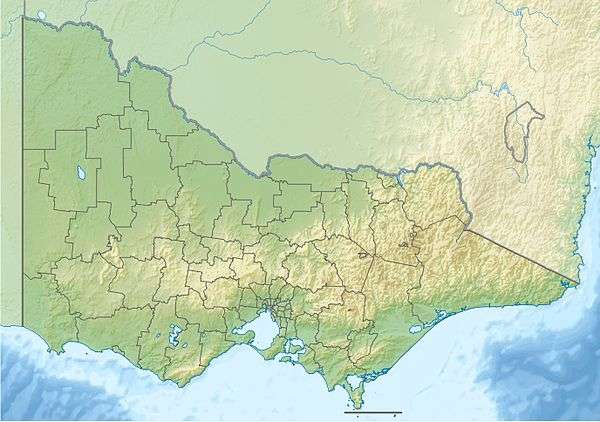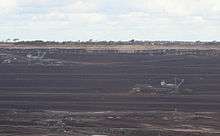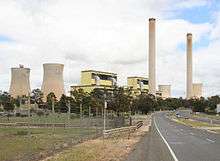Loy Yang Power Station
| Loy Yang Power Station | |
|---|---|
|
Loy Yang B (left), Loy Yang A (centre), coal bunkers from open cut mine (right). | |
 | |
| Country | Australia |
| Location | Traralgon, Victoria |
| Coordinates | 38°15′16″S 146°34′37″E / 38.25444°S 146.57694°ECoordinates: 38°15′16″S 146°34′37″E / 38.25444°S 146.57694°E |
| Status | Operational |
| Commission date | 1985 |
| Owner(s) |
|
| Thermal power station | |
| Primary fuel | Brown coal |
| Power generation | |
| Units operational |
|
| Make and model |
BBC Siemens Hitachi |
| Nameplate capacity | 3,300 MW (4,400,000 hp) |
The Loy Yang Power Station is a brown coal-fired thermal power station located on the outskirts of the city of Traralgon, in south-eastern Victoria, Australia. It consists of two sections, known as Loy Yang A and Loy Yang B. Both Loy Yang A and B are supplied by the Loy Yang brown coal mine. The Loy Yang power stations are located in the brown coal rich Latrobe Valley, along with the Hazelwood and Yallourn power stations.
Loy Yang A has four generating units with a combined capacity of 2,200 MW (3,000,000 hp). AGL Energy owns and operates both Loy Yang A and the Loy Yang coal mine.
Loy Yang B has two units with a capacity of 1,050 MW (1,410,000 hp) and is Victoria's newest and most efficient brown coal-fired power station. It can generate around 17% of Victoria's energy needs. It is jointly owned by Engie (formerly GDF Suez Australia), which holds a 70 per cent stake, and Mitsui & Co Ltd (30 per cent). Loy Yang B employs up to 152 full-time staff and another 40 contractors.
If Loy Yang A and Loy Yang B are counted together they the largest power station in Australia, generating over 3,000 MW (4,000,000 hp) of power (however, if counted separately, the 2,880 MW Eraring power station is the largest). Loy Yang is a base load supply station, and produces about one third of Victoria's electricity requirements.
History

Loy Yang was originally constructed through the 1980s by International Combustion Australia Ltd, who was contracted by the government owned State Electricity Commission of Victoria (SECV). It consists of two separate units, Loy Yang A and Loy Yang B. Constructed in stages, it was originally planned that the Loy Yang complex would consist of eight generating units, of 525 megawatts (704,000 hp) each upon completion. The privatization of the SECV resulted in only six generating units being completed, four in Loy Yang A and two in Loy Yang B.
Loy Yang A's four units were completed between 1984 and 1988.[1] Loy Yang A consists of three units with Siemens alternators (units 1, 3 and 4) and one unit by Brown Boveri Corp (unit 2) that was supposed to be the second unit at the gas-fired Newport power station.
Loy Yang B's two units entered service in 1993 and 1996.[2] The two units have Hitachi turbo generators. All six Loy Yang boilers are of the forced circulation tower type and are made by International Combustion Australia Ltd. Steam is supplied at a pressure of 16 MPa and a temperature of 540 degrees Celsius.
The Loy Yang complex was privatised in 1995, as were most of the assets of the SECV. Prior to the Victorian Government's privatisations from the mid-1990s, a 49 per cent stake of Loy Yang B was sold to Mission Energy. Later Edison Mission bought the complete plant, and later again sold it to the joint venture International Power Mitsui.
In 1995, Loy Yang B was the world's first coal-fired power station to gain quality accreditation to ISO 9001 and the first Australian power station to gain environmental accreditation to ISO 14001.
Four giant bucket-wheel excavators, called dredgers, operate 24 hours a day in the Loy Yang open cut mine, mostly feeding coal directly to the boilers via conveyor belt, 18 hours of reserve supply is held in a 70,000 tonnes (69,000 long tons) coal bunker. Each year approximately 30 million tonnes (30×106 long tons) of coal are extracted from the open pit. The open cut coal mine pit is about 200 metres (660 ft) deep, 3 kilometres (1.9 mi) and 2 kilometres (1.2 mi) wide at its widest. It is estimated that at current rates of extraction there are sufficient deposits of coal in the entire Latrobe Valley region to last 1300 years.
Carbon Monitoring for Action estimates this power station emits 14.4 million tonnes (14.2×106 long tons) of greenhouse gases each year as a result of burning coal.[3] On 3 September 2007 the Loy Yang complex was the target of climate change activists. The activists locked themselves to conveyor belts and reduced power production for several hours before being cut free. Four people were arrested.[4]
In March 2010 it was announced that the operators of Loy Yang A (Loy Yang Power) signed a contract with Alcoa World Alumina and Chemicals Australia for the supply of electricity to power aluminium smelters at Portland and Point Henry until 2036.[5] The Point Henry Smelter ceased operation in 2014 and is now closed.
Gallery
 Two large dredges working coal face, and smaller unit on the mine floor.
Two large dredges working coal face, and smaller unit on the mine floor. Loy Yang A.
Loy Yang A. Loy Yang B.
Loy Yang B.
See also
References
- ↑ "AGL Loy Yang | AGL". www.agl.com.au. Retrieved 2016-07-06.
- ↑ "Loy Yang B Power Station | ENGIE". www.gdfsuezau.com. Retrieved 2016-07-06.
- ↑ "Loy Yang A". Carbon Monitoring for Action. Retrieved 18 January 2014.
- ↑ "APEC Climate Action Shuts Down Victorian Coal Power Station A". Indymedia. 3 September 2007. Retrieved 5 September 2007.
- ↑ "Alcoa deal locks in jobs - and emissions". The Sydney Morning Herald. 2 March 2010. Retrieved 18 January 2014.
External links
- Loy Yang Power
- International Power
- "AEMO Participant Registration List". Retrieved March 2014. Check date values in:
|access-date=(help)
